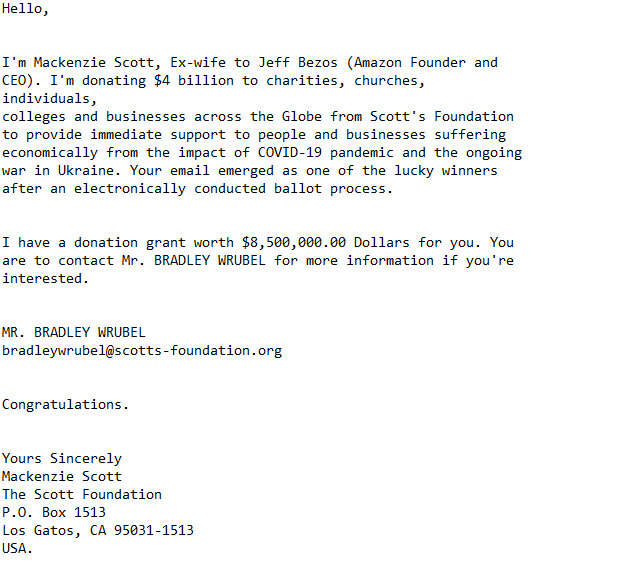What is the “Donation Grant For You” spam email
The “Donation Grant For You” email falls into the spam email category. It’s a very common type of email that claims recipients have been selected to receive a large sum of money. This particular email claims that you will receive a donation of $8.5 million, supposedly from Mackenzie Scott, who is known for having donated large sums of money to various charities and foundations after her divorce from Jeff Bezos. It goes without saying that the email is a scam and should be ignored.
“Donation Grant For You” spam email is a very old type of scam. These types of scams claim that users have won, inherited, etc., some amount of money, usually several millions of dollars. Recipients are asked to engage with the emails and provide their personal information. Once contact between the potential victim and the scammer has been established, scammers will eventually ask for money. They will come up with many reasons why they first need money to send the promised millions. It may be to prove that a bank account is active, to fix some unforeseen issues, etc. If scammers see that the victim is more susceptible, they may even request money several times before disappearing.
These types of scams are essentially the modern version of the “Spanish Prisoner” scam which dates back to the late 18th century. Back in those days, people were contacted by scammers who claimed that they were trying to smuggle wealthy individuals from a prison in Spain. Potential victims were asked to give money to supposedly bribe the guards and were promised a lot of money in exchange for the help.
The sender of this particular “Donation Grant For You” spam email claims to be Mackenzie Scott, the ex-wife of billionaire Jeff Bezos. She has, over the years, donated billions of dollars to various charities and foundations. The email claims that she is donating $4 billion to charities, churches, individuals, colleges, businesses, etc. The recipient has supposedly been selected to receive $8.5 million. Those interested are asked to contact someone called Bradley Wrubel.
The full “Donation Grant For You” spam email is below:
Subject: CONGRATULATIONS…
Hello,
I’m Mackenzie Scott, Ex-wife to Jeff Bezos (Amazon Founder and
CEO). I’m donating $4 billion to charities, churches,
individuals,
colleges and businesses across the Globe from Scott’s Foundation
to provide immediate support to people and businesses suffering
economically from the impact of COVID-19 pandemic and the ongoing
war in Ukraine. Your email emerged as one of the lucky winners
after an electronically conducted ballot process.I have a donation grant worth $8,500,000.00 Dollars for you. You
are to contact Mr. BRADLEY WRUBEL for more information if you’re
interested.MR. BRADLEY WRUBEL
bradleywrubel@scotts-foundation.orgCongratulations.
Yours Sincerely
Mackenzie Scott
The Scott Foundation
P.O. Box 1513
Los Gatos, CA 95031-1513
USA.
If recipients engage with the email and contact the mentioned person, they will be asked to provide some personal information, including their full name, home address, phone number, etc. The more emails are exchanged between the scammer and the recipient, the more personal information will be requested. The scammers will also try to establish trust so that the recipient is easier to trick. After several emails and once trust has been established, scammers will eventually ask for money. The reasons for needing the money may vary but it will be something that makes little sense. However, because scammers have already established trust, victims may not think twice about it.
If scammers successfully phish personal information, it will either be used by the scammers themselves or sold on hacker forums. Personal information like full name, home address, and phone number are hot commodity information among cybercriminals because it can be used to perform sophisticated scams. People are more likely to fall for a scam if scammers address them by name and/or mention other personal information. If scammers get victims to reveal their credit card information, they will use it to make unauthorized purchases and transactions.
Emails that promise large sums of money are always scams. The rule of thumb is if something sounds too good to be true, that’s because it is. Nothing about this “Donation Grant For You” email email looks even remotely legitimate. These emails likely target the older generation who may not be familiar with such scams and have not encountered them before.
Why did you receive a scam email?
Users who receive scam emails may wonder how their email addresses end up in the hands of cybercriminals. In some cases, scammers may be targeting random users but in most cases, a scam email means the user’s email address has been leaked. Unfortunately, email addresses are leaked all the time by all kinds of services because of poor security. Users can check whether their email address has been leaked on haveibeenpwend. It should also be mentioned that in addition to email addresses, other information is also leaked. There’s not much users can do if their information has already leaked but they can at least be more vigilant when dealing with unsolicited emails, phone calls, etc.
Site Disclaimer
WiperSoft.com is not sponsored, affiliated, linked to or owned by malware developers or distributors that are referred to in this article. The article does NOT endorse or promote malicious programs. The intention behind it is to present useful information that will help users to detect and eliminate malware from their computer by using WiperSoft and/or the manual removal guide.
The article should only be used for educational purposes. If you follow the instructions provided in the article, you agree to be bound by this disclaimer. We do not guarantee that the article will aid you in completely removing the malware from your PC. Malicious programs are constantly developing, which is why it is not always easy or possible to clean the computer by using only the manual removal guide.

